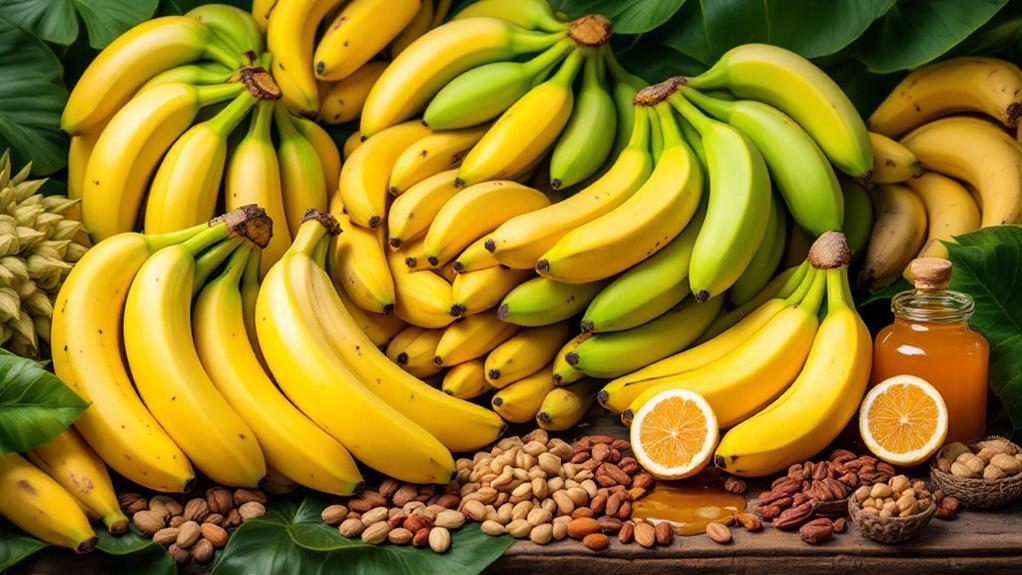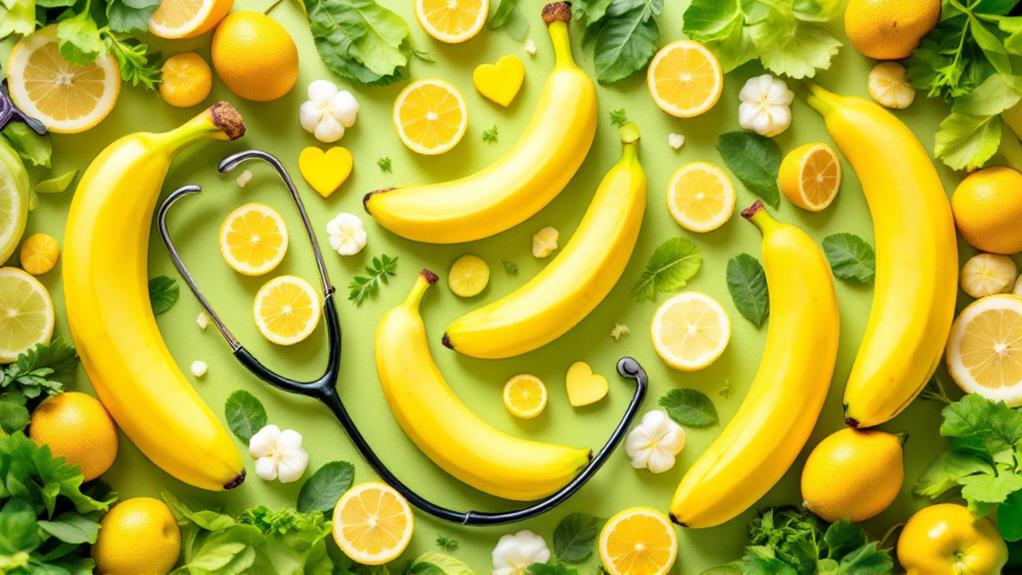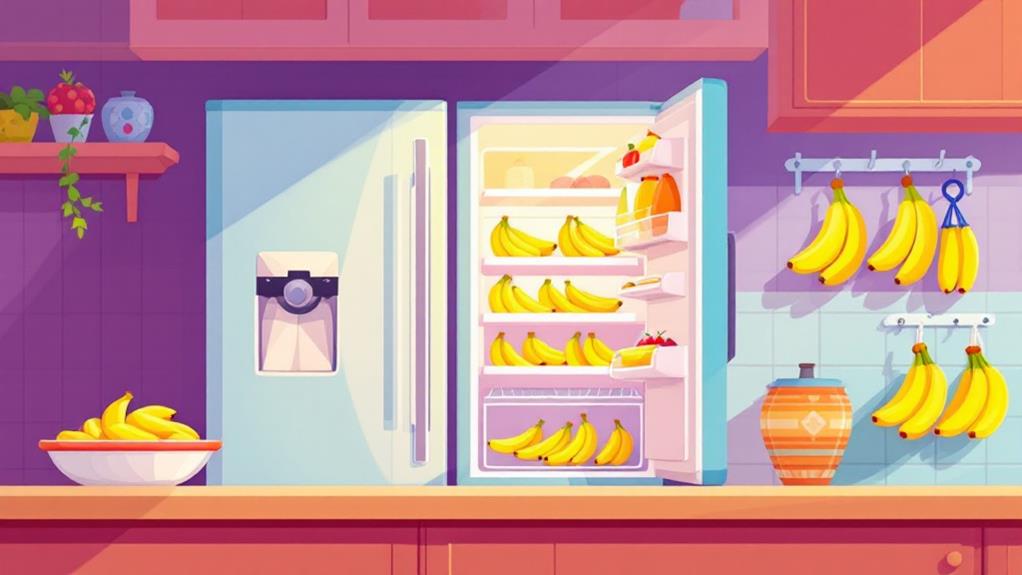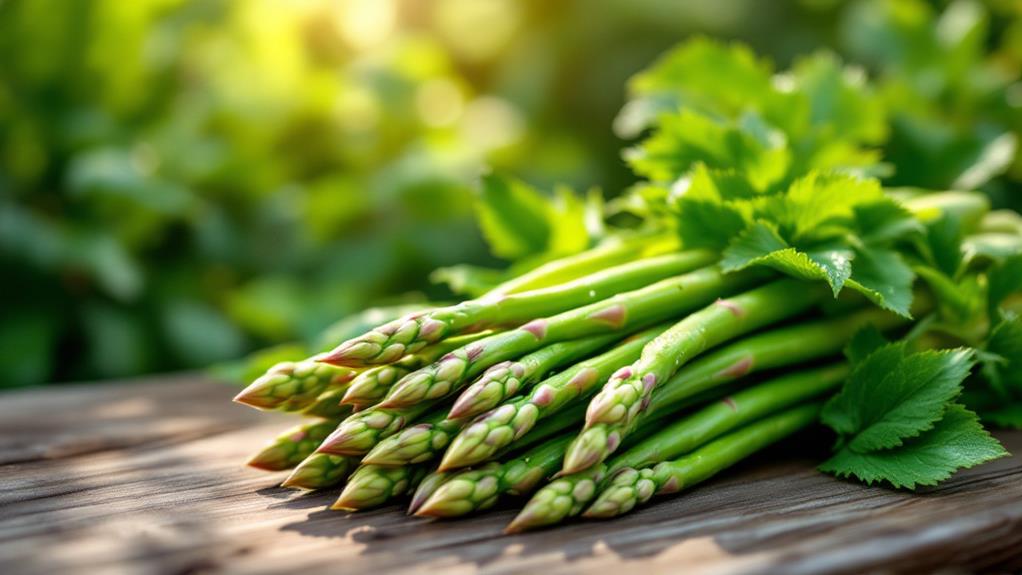The Ultimate Guide to Bananas: Varieties, Nutrition, and Health Benefits

When exploring bananas, you'll find a range of varieties like the sweet Cavendish, starchy plantains, tasty red bananas, and petite Lady Fingers. They're low in calories, high in potassium, and offer essential vitamins like B6 and C. Eating bananas aids heart health, supports digestion, and even enhances your mood. They're versatile in the kitchen—perfect for breakfast toppings, smoothies, and baking treats. For storage, ripen them at room temperature or freeze them for later use. With every bite, bananas promise more than just a snack, revealing layers of health benefits and culinary possibilities.
Types of Bananas
When exploring the diverse world of bananas, you'll find a fascinating array of varieties, each with its unique characteristics and uses. The Cavendish banana, with its mild sweetness and familiar yellow skin, dominates global production. It's a staple in many households, appreciated for its taste and nutritional benefits, including a good dose of potassium. In contrast, plantains stand out with their larger, starchier form. Unlike their yellow counterparts, they're typically cooked and serve as a staple carbohydrate source in tropical regions, where their health benefits are well recognized.
Red bananas offer a delightful switch with their sweet taste and dark reddish-purple skin. They're shorter and plumper than the Cavendish, offering a unique flavor profile that can improve your fruit selection. You might also enjoy the Lady Finger bananas, known for their small size and rich, sweet flavor. They're perfect for a quick snack or a delectable dessert.
Each of these varieties provides an array of nutritional benefits and can be enjoyed in different ways, showcasing the versatility and health benefits of bananas across tropical regions and beyond. Regardless of your cooking, snacking, or exploring new flavors, there's a banana for you.
Nutritional Profile
How often do you consider the nutritional punch packed into a simple banana? When you peel back that yellow skin, you're holding a powerhouse of nutrients that can benefit your health in many ways. Bananas showcase an impressive nutritional profile, making them a standout choice for a healthy diet. They're a low-calorie option at just 89-105 calories per medium fruit, with only 0.3 grams of fat. This makes them perfect for a guilt-free snack.
Bananas are rich in carbohydrates, providing about 22.8 grams per medium banana, primarily from natural sugars. As they ripen, these sugars—sucrose, fructose, and glucose—increase, offering a quick energy enhancement. With around 3 grams of dietary fiber, bananas help promote digestive health and regularity.
Potassium is one of the highlights of bananas, with each medium fruit delivering about 422 mg. This mineral is crucial for heart health and maintaining healthy blood pressure levels. Moreover, bananas supply key vitamins like vitamin B6 and vitamin C, supporting immune health and numerous bodily functions. So, next time you grab a banana, remember you're not just enjoying a tasty treat, but also nourishing your body.
Health Advantages

Despite their simplicity, bananas offer remarkable health benefits that make them more than just a convenient snack. Packed with potassium, they provide around 422 mg per medium banana, supporting heart health by regulating blood pressure. This can potentially lower your risk of heart disease by 26%. Moreover, the dietary fiber content, approximately 2.6-3 grams per banana, is essential for digestive health. It promotes regular bowel movements and may even help prevent colorectal cancer.
Bananas also shine in their ability to manage blood sugar levels due to their low glycemic index of 51. This makes them suitable for diabetes management, offering quick energy through natural sugars without causing significant spikes. In addition, they're rich in vitamin B6, contributing about 33% of your daily value, which supports neurotransmitter function and may improve your mood by aiding serotonin production.
Apart from these, bananas contain antioxidants like dopamine and catechins that may reduce oxidative stress and inflammation, consequently potentially lowering the risk of chronic diseases such as heart disease. Here's why bananas are a mighty supplement to your diet:
- Heart health
- Blood pressure regulation
- Digestive health
- Blood sugar management
Culinary Applications
Bananas aren't just powerhouses of nutrition; they also shine in the culinary world. You can transform your morning routine by adding bananas to your breakfast. Slice them over oatmeal or cereal to enhance your fiber and potassium intake while enjoying a naturally sweet taste. Regarding smoothies, bananas are a must-have ingredient. They provide creaminess and natural sweetness, making your drink both delicious and packed with health benefits.
In baking, bananas are a staple. Their moisture and flavor raise banana bread, muffins, and pancakes to a whole new level. You'll love how easy it is to incorporate bananas into your favorite recipes for a healthier twist. Don't forget about dessert! Grilled or fried bananas make for a unique treat, offering caramelized flavor that satisfies any sweet tooth.
For savory dishes, plantains are your go-to. You can cook them up for salads, curries, or as a savory side dish, adding a unique taste and texture to your meals. Bananas and plantains open up a world of culinary possibilities, allowing you to enjoy their health benefits in a variety of delicious ways.
Storage Tips

In relation to keeping your bananas fresh, a few simple strategies can make all the difference. Start by storing your bananas at room temperature and away from direct sunlight to guarantee ideal ripening and freshness. If you're keen to speed up the ripening process, simply place them in a brown paper bag. This traps ethylene gas, which bananas naturally release, accelerating their ripening. However, if you want to slow it down, keep bananas away from other fruits, as the ethylene can hasten their ripening too.
When it comes to refrigeration, timing is key. Avoid refrigerating green bananas since the cold can disrupt their ripening process. But once they're fully ripe, you can refrigerate them to extend their shelf life. Don't worry if the peel darkens; the fruit inside remains deliciously fresh.
For long-term storage, freezing is a fantastic option. Here's how to do it:
- Peel the bananas to prevent the peel from turning mushy.
- Slice them into manageable pieces.
- Store them at 0°F (-18°C) or lower.
- Use them later in smoothies or baking.




